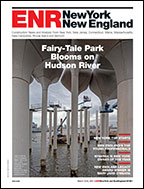Transit projects in Denver, San Francisco, Hartford, Honolulu and Minneapolis will get a first-time boost from the Federal Transit Administration’s New Starts program for fiscal year 2011. But FTA administrator Peter Rogoff conceded that the consistency of annual levels of funding will be uncertain as long as the six-year transportation reauthorization bill is delayed.
At a Feb. 2 press conference, Rogoff announced $1.82 billion for 27 major transit projects for FY 2011. That includes $835 million for 19 new construction projects, including $80 million for two rail lines in Denver, $45 million for a busway to connect Hartford and New Britain in Connecticut, $55 million for Honolulu’s planned elevated rail line, $20 million for a new San Francisco light rail line, and $45 million for Minneapolis-St. Paul’s planned light rail.
Under the Full Funding Grant Agreements, the FTA will make annual payments to selected projects until it fulfills its total promised amount. In 2011, ongoing FFGA projects include New York City’s East Side Access project, which is slate to receive a payment of $215 million, and its Second Avenue Subway, to receive $197 million. Salt Lake City will receive a total of 180 million in 2011 for two light rail projects.
Small Starts projects, each costing $250 million or less, included bus rapid transit lines in Brooklyn; Austin, Tex.; Seattle; four cities in California and two in Colorado.
Asked if the New Starts program could be affected by President Obama’s vows to cut budget costs, he replied: “We are growing as a department. The president discretionary freeze is a dynamic one...there are programs that uptick and downtick. This agency budget spiked 80% due to [the stimulus bill].”
Honolulu’s planned $5.3-billion, 20-mile rail line is controversial, with the state governor questioning its financial robustness. “We have differing thresholds in terms of how far a project must be developed before it enters each phase,” said Rogoff. “ FTA was pleased and supportive of the project into preliminary engineering. We signaled — as with many projects — that it did need to strengthen its financial phase to get to next phase. We would not have included funding if we thought it was falling off the rails. We expect to continue working with them to strengthen the financial plan.”
The planned $920-million, 11-mile Minneapolis-St. Paul Central Corridor is facing lawsuits by the University of Minnesota and the NAACP. “That’s not out of the ordinary,” said Rogoff. “We will continue to move the project forward, lawsuits or no lawsuits — up and until someone gets a temporary restraining order. We would fight it.”
The full list of projects can be found online at www.fta.dot.gov.



Post a comment to this article
Report Abusive Comment